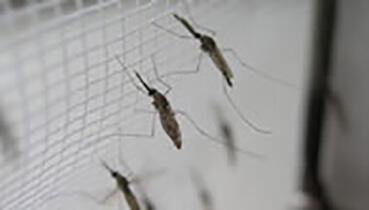
This Thursday marks the anniversary of one of the most important scientific discoveries in the battle against malaria. On 20th August 1897, the transmission of malaria by mosquitoes was established by Ronald Ross, a British doctor working in India who became LSTM’s first senior lecturer. He was awarded the Nobel prize for medicine in 1902 for his discovery.
Ross was born in India in 1857 and returned there in 1881 after education and study in England leading to his medical qualification. He was commissioned into the Madras branch of the Indian Medical Service and as Acting Garrison-Surgeon to Bangalore in1 883, Ross became interested in the breeding habits of mosquitoes. In 1896, Ross was nearing his breakthrough and wrote: "The belief is growing on me that the disease is communicated by the bite of the mosquito... She always injects a small quantity of fluid with her bite - what if the parasites get into the system in this manner."
On 20 August 1897, in Secunderabad, India, Ross had his breakthrough, during the dissection of the stomach tissue of an anopheline mosquito fed four days previously on a malarious patient. He found the malaria parasite, from which he proved the role of Anopheles mosquitoes in the transmission of malaria parasites in humans.
Declaring himself that this date be remembered as World Mosquito Day, his work was soon verified by a colleague, Surgeon-Major John Smyth and Ross wrote a paper which was later published in the British Medical Journal.
Ross left the Indian Medical Service in 1899 to become the first senior lecturer, then Professor, at the Liverpool School of Tropical Medicine (LSTM), the first institution devoted to tropical medicine anywhere in the world. His work at LSTM led to many distinguished honours and numerous expeditions to Africa, Asia and South America.
Commenting on his legacy and the continuing fight against the disease, Professor Steve Ward, Deputy Director, LSTM said: “Malaria is still a devastating disease, with nearly 250 million cases and more than one million deaths every year. Mosquitoes have developed resistance to existing insecticides and there is evidence of emerging resistance by the parasite to the drugs used to treat the disease. New drugs and insecticides are required to combat malaria in the 21st century and LSTM is continuing the work of Ross by leading a number of global projects to prevent death and suffering due to malaria. All of this would not have been possible without his work and the other early pioneers who risked their lives to gain greater understanding of what was and still is one of the world’s biggest killers.”
-ends-
For further information, please contact:
Alan Hughes, Communications Manager
Office: +44 (0)151 705 3308
Mobile: +44 (0)7759 243969
Notes to Editors
Examples of how LSTM is continuing the fight against malaria include:
Innovative Vector Control Consortium (IVCC)
IVCC is a Product Development Partnership (PDP) established to overcome the barriers to innovation in the development of new insecticides to control mosquito populations and the development of information systems and tools which will enable new and existing pesticides to be used more effectively. New insecticides are a priority, however none of the current agrochemicals fulfil the product specification required for effective use on bednets. LSTM Director and IVCC Chief Executive Officer Professor Janet Hemingway says “The best hope for new chemistry that will fill this important role in future is likely to come from the large scale screening programmes that the IVCC is now operating with multiple large agrochemical industry partners.”
Malaria in Pregnancy (MiP) Consortium
In an attempt to reduce the hundreds of thousand of deaths that occur as a result of malaria in pregnancy each year, the MiP Consortium is undertaking a programme of research to evaluate existing interventions for the prevention and treatment of malaria. The Consortium is focusing on prevention, treatment, burden assessment and how best to scale up existing strategies and interventions. The Consortium of 41 research institutions is led by LSTM’s Professor Feiko ter Kuile, who says “One of the Consortium’s key objectives is to identify new antimalarial drug combinations that are safe, effective and practical to use for the treatment of uncomplicated malaria in pregnancy in Africa, Asia and Latin America.”
AntiMal
A lack of effective, safe and affordable drugs to treat malaria led to the formation of AntiMal, an integrated project comprising leading groups of malaria researchers with expertise in malaria biology, chemotherapy and drug development. Forty leading research groups are working together to exploit new scientific and political opportunities to secure the development of a portfolio of viable novel antimalarial drugs, whilst strengthening malaria drug research capabilities within African institutions. AntiMal is led by Professor Steve Ward (LSTM Deputy Director) who says “There remains an urgent need for new, safe and affordable antimalarials for patients in resource poor settings and AntiMal aims to fill that gap.”